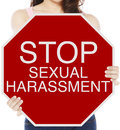 Given recent developments in Hollywood, sexual harassment has returned to the forefront of the American conscience. But, sexual harassment has been a workplace reality ever since men and women have worked together. Whether due to males who because of a sense of empowerment feel no restraint in coming on to a subordinate or a desire to dominate others, sexual harassment remains a scourge and reality in many workplace environments.
Given recent developments in Hollywood, sexual harassment has returned to the forefront of the American conscience. But, sexual harassment has been a workplace reality ever since men and women have worked together. Whether due to males who because of a sense of empowerment feel no restraint in coming on to a subordinate or a desire to dominate others, sexual harassment remains a scourge and reality in many workplace environments.
Sexual harassment happens in many ways. It can include unwelcome sexual advances, requests for sexual favors, and other verbal or physical harassment of a sexual nature. A few examples include:
- Comments about a person’s body or sexual relationships, activities or experience;
- Unwelcome physical contact such as hugging, rubbing, touching, patting, pinching or brushing another’s body;
- Veiled requests or suggestions of sexual activities;
- Requests for private meetings outside of business hours for other than legitimate business-related purposes;
- Use in the workplace of sexual jokes, stories or images; and
- Use of inappropriate body images to advertise products or services.
Note that harassment does not have to be of a sexual nature. It can include offensive remarks about a person’s gender. Also, the law protects you against harassment whether by a supervisor, a supervisor in another area, a co-worker, or someone who is not an employee of the employer, such as a client or customer.
Thankfully, the law has continued to evolve in favor of sexual harassment victims. There is meaningful recourse for you to pursue to hold a sexual harasser accountable. If you are experiencing harassment in the workplace, you can best protect yourself by promptly seeking legal guidance from an attorney experienced in handling sexual harassment cases. Our firm has substantial experience in assisting victims of harassment. You should also know that an employee rights lawyer may be able to help you reach a confidential settlement without the necessity of filing a lawsuit. But, don’t go it alone. Contact Frank Lopez at 303-861-5300 for a free explanation of your rights and to have your matter evaluated.
You can also help protect your rights by taking the following steps:
- Document: Write down any inappropriate comments the harasser made, including the date, when and where it occurred, and who was present. You should also take pictures of any physical evidence (e.g., graffiti) that offended you.
- Preserve Evidence: Save e-mails, text messages, pictures, voicemails and any other evidence related to the sexual harassment.
- Tell Harasser to Stop It! Tell the harasser to stop the harassment, and do not try to be nice and send a smiley-face emoji or “lol” in response to the harassment.
- Report it to Police: If you are sexually or physically assaulted, immediately contact the police and file a police report.
- Report it to HR: Review the company’s policy against sexual harassment, which is often found in the employee handbook, to see if it designates a specific person responsible for receiving a sexual harassment complaint. Do not only complain orally; email a written statement detailing the sexual harassment. Also, keep in mind that the HR staff is there to protect the company and not you, no matter what they tell you to the contrary.
- Report Retaliation: If you experience any kind of retaliation after reporting your sexual harassment complaint, document the retaliation and report it to HR in writing.
- Contact Legal Counsel: Contact for confidential advice an employment law attorney with experience in handling sexual harassment matters.
- Act promptly: You may be prohibited from pursuing even the most meritorious sexual harassment claim if you wait too long. Depending on where you are employed you may have a very short period of time to file your claim or you will lose your right to do so.
Many women suffer in silence after being sexually harassed. But experience shows that remaining silent and hoping the problem goes away rarely works. Usually what happens is the bad behavior escalates and/or the harasser finds additional victims. Thus, protecting your rights can help make a big difference in stopping the cycle of abuse and bringing about real change in the workplace.
Please contact us if we can help. We are here to help you protect your rights!
IMPORTANT NOTICE
This Blog provides general information regarding developments in the law. The following apply to the Blog:
- It is for general informational purposes only. It does not constitute legal or other professional advice.
- It is not a substitute for formal legal research or the advice of an attorney licensed in your state.
- Reading the Blog does not create an attorney-client (or any other) relationship between you and the Firm.
- Inclusion of material in the Blog is not meant to imply or suggest that this Firm is in any way connected to its subject matter.
- We routinely make non-substantive editorial modifications – e.g., deleting internal quotation marks and citations, modifying formatting/paragraphing, etc. – without notation to enhance readability.
If you have questions about the Blog, including suggestions, please feel free to contact us at 303-861-5300.